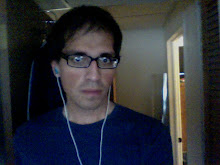-- A Juilliard-trained pianist does not look down on the world. We don't play piano for a living.
-- A professional surfer does not look down on the world. We don't surf for a living.
They're the pros. We're not. They play piano or surf on a higher level.
Literature is different. The lines of "pro" and "amateur" don't exist like that. Lots of people read, for many different reasons. But there ARE different levels of playing this game.
Hardcore readers, if I may be so conceited, are somewhat like the pros in other fields.
Self-proclaimed experts we may be, but we're practicing literature on a
different, more advanced level by reading and analyzing shit like Pynchon and
Joyce. It's not about "better" or "smarter". We just play this game on a
different level. If a hardcore reader fails to understand this, he may easily
come across as arrogant to a casual reader.
I have a friend who hates Pynchon, who couldn't get his head into it, called it trash, and I laughed at him. But it's true, isn't it? Everyone does read on different fields. See: unlike the pianist and surfer example, anyone can read, anyone, that is, with the attention span and patience. People can learn piano but may lack that natural talent to be sublime at it; people can try to surf yet some lack that balance or athletic ability to excel at it; everyone, though can read, and schools already put different levels of reading on us. Generally people who read Dan Brown and Tom Clancy and Michael Crighton (who's all right; at least better than those other two) and James Patterson regularly, the ones who claim these people are the best writers, like, ever -- and believe me, I've come across people who believe this -- aren't going to be tackling literature, literature that satisfies them on the same level as those who devour Pynchon or Joyce or Garcia Marquez or Crowley. Unlike surfers or pianists, there are no professional readers, including critics who are a form of writers above all, so that line can be blurred quite often.
It all comes down to what's most satisfying for the reader. What moves them to their very core the most. Some people just want something quick, to pass the time when they're not doing anything, so you see this popular fiction populating the newsstands of cheap grocery stores and discount department stores. When you've read a lot, especially if you've read a lot of pieces that are actually good, that actually have quality about them, you find this pulp about the equivalent to a greasy hamburger fast food resturant. Since the more hard-core readers among us, and I'd include myself in this category, consume more of greatness, it's difficult for us to imagine why other people might want something fleeting; making us come off as arrogant, pompous, pretentious boobs.
Is reading a game? Are there then different levels of reading? A low, where people read Brown and think he's the God of Writing? A middle and then a high? That's not to say the people who write specifically at these levels are terrible: I like J. K. Rowling for one, though I believe she's a better storyteller than a writer and at the same time I really hate Raymond Carver, one of those literary gods I hear so much about in my department, who can construct great sentences, sure, but his stories don't go anywhere. That's just me. This whole thing differs between people to people.
Is it really arrogance or misperception?

No comments:
Post a Comment